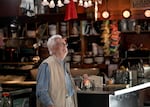Former Portland Mayor Bud Clark, who stunned an incumbent mayor with his election in 1984, has died. He was 90.

In a 2015 file photo, Bud Clark, Portland’s former mayor who was known as a colorful character and had a deep love for his city. Clark led Portland from 1985-1992.
John Rosman / OPB
Despite his two terms running Oregon’s largest city, Clark may be best remembered as the model in the famous “Expose Yourself to Art” poster.
The poster, which showed Clark in a trench coat flashing a sculpture in downtown Portland, captured the same insouciant style that drove him to a surprising mayoral victory over Frank Ivancie in May 1984. That win was enough of an upset that it earned Clark an appearance on the iconic Tonight Show with Johnny Carson.
When Clark came on stage, he gave the crowd what had become his trademark greeting on the campaign trail, a high-pitched yell of “Whoop, whoop!” Carson, like many who first encountered Clark, was confused: “Now someone told me something about that — now exactly what is that?”
As news of Clark’s death spread, leaders who have followed him into office were quick to share memories.
“When I moved to Portland 30 years ago, Bud Clark was Portland’s Mayor. It was always a blast to see our own Mayor biking all over the City and being so accessible to the community,” Portland Commissioner Jo Ann Hardesty wrote on Twitter.
I will miss his quick smile and sense of optimism for Portland. I’m holding his loved ones in my thoughts on this tragic day.
— Commissioner Jo Ann Hardesty (@JoAnnPDX) February 2, 2022
Chair of the Multnomah County board of commissioners, Deborah Kafoury, offered condolences to Clark’s family and called the former mayor “one-of-a kind.” Her mother, Gretchen Kafoury, served with Clark on the Portland city council in the early 1990s.
He was one-of-a-kind. All my love to the Clark family. pic.twitter.com/6wwFnu7jWv
— Deborah Kafoury (@dkafoury) February 2, 2022
A style all his own
Explaining Clark’s quirks and revisiting his eccentricities might be a little easier than explaining how he became Portland mayor.
Clark was born in Idaho, and his parents split when he was 2. He moved with his mother to Portland as a child and didn’t see his dad again until he was a teenager.
Clark served in the Marines in the early 1950s and, though he attended several Oregon colleges, he never got a degree.
When he hitchhiked south into California, he landed homeless at the Big Sur Inn.
“They said, ‘Come on in,’ and they needed to wash dishes because they were really busy right then, it was a restaurant,” he told OPB several years ago. “And so I did that. I went to sleep in the woods. They came and woke me up. They needed someone to clean up rooms.”
Clark would return to Portland, where he and his wife bought the Spatenhaus bar for $1,600. They borrowed money to have beer to serve and change in the till. They later bought the bar that Clark became known for: the Goose Hollow Inn.
Oregon historian Chet Orloff said the Goose Hollow pub reflected Clark’s personality.
“So you’d find people of many political stripes, but who got along, which I think was one of the core qualities and elements of the place,” Orloff said.
Clark was popular with social service advocates. He once agreed to get his picture taken in a T-shirt warning against sexually transmitted diseases. But the most famous photo from that day shows Clark became the iconic “Expose Yourself to Art” poster.
“250,000 copies had been sold before I ran for mayor in 1983, or ‘84,” he later said. “It’s still sold today, still gone through another printing, and it’s still funny.”
When Clark finally decided to run for mayor, local newspapers mostly ignored his campaign.
But he won that year’s May primary outright, shocking the political establishment and signaling the rising power of Portland neighborhood associations versus downtown business interests.
“I’ve been in this business a long time and Bud Clark was an excellent mayor,” said U.S. Rep. Earl Blumenauer, a Portland Democrat who served on the City Council for six of Clark’s eight years in that role. “He laid the foundation for many things that we’re enjoying now.”
Blumenauer recalled a citizen-mayor who biked to City Hall and cleared sewer drains with a golf club. In office, Clark pushed a 12-point plan to fight homelessness, and he helped build the Oregon Convention Center and expand light rail.
“He was much, much smarter than people recognized — very savvy, very tough, very committed, and very human,” Blumenauer said.
But Clark could be tough, too. He went through six police chiefs, as police and the African American community battled. Clark outlawed the police chokehold after a Black man was killed that way.
“Two police officers in the precinct, because I’d banned the chokehold, made these T-shirts and were selling them in the parking lot, saying ‘smoke ‘em, don’t choke ‘em,’” Clark said. “I mean I couldn’t understand how they could have the stupidity to do something like that, so I fired them, and the chief went along with it — Penny Harrington at that time. Then, of course, they came back and got re-hired.”
Old friends say Bud Clark focused on the city’s people rather than its buildings. Clark suggests looking past City Hall to another building, to remember him by.
“Well I’ve thought about this, you know, you talk about a legacy — I think this Goose Hollow Inn is my legacy,” Clark told OPB. “It’s put together well, it still runs, my daughter runs it well. And I’ve met so many friends here. It’s been a wonderful life.”
